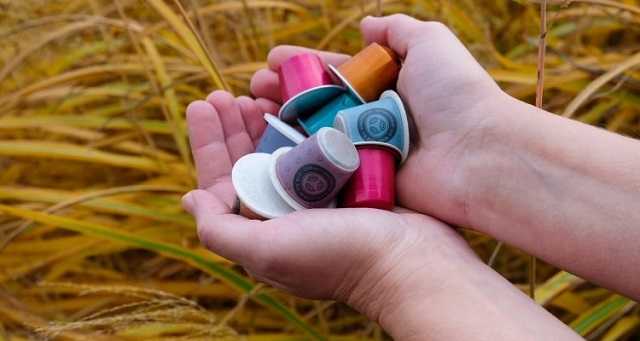WAGENINGEN, The Netherlands – Wageningen University & Research has assessed the environmental impacts and circularity of different materials for single serve coffee capsules, when subjected to various end-of-life scenarios. When both material circularity and greenhouse gas emissions are considered, compostable capsules are the most sustainable option.
“Annually, billions of coffee capsules are used in Europe. Even though coffee grounds contribute the most to greenhouse gas emissions when it comes to single serve coffee use, the material used in these capsules has a sizable impact nonetheless,” project lead Ingeborg Smeding explains. She and her colleagues have analysed the impact of three types of capsules: compostable biobased capsules, conventional plastic capsules and aluminium capsules.
Material Circularity Indicator
Smeding: “The unique aspect of this research is that we haven’t just looked at greenhouse gas emissions, because that is only part of the story. By considering also the circularity of the materials we gain a broader perspective of the sustainability of the various options.”
The circularity was quantified with the Material Circularity Indicator (MCI), a tool developed by the Ellen MacArthur Foundation. This indicator is one of the most complete tools available as it encompasses recycling rates, recycled content, recycling process yield, biobased content, reusability and average lifespan.
Single serve compostable capsules most sustainable, aluminium second-best
When taking into account both greenhouse gas emissions and circularity, the main conclusion is that compostable plastic capsules are the most sustainable option. Their MCI is 100% (fully circular) when the capsules are composted: materials are both biobased (non-fossil based) and biodegradable.
Both coffee grounds and capsule material can be kept in the loop as they are “organically recycled” via the biosphere into compost. Compostable options remain sustainable even when consumers dispose of the capsules in the ‘wrong’ container. Currently in the Netherlands, the main hurdle is getting compostable coffee capsules accepted in the separately collected municipal organic waste.
Aluminium capsules are a second-best choice if they are collected separately through systems designed exclusively for returning these capsules (mono-collection): the aluminium is then recycled and the coffee composted. However, the MCI is lower (around 60%) compared to compostable capsules, even when recycled aluminium is used to produce the capsules. A closed recycling loop is not feasible because untargeted trace elements will accumulate in the aluminium, making it less pliable over time. Another main challenge is to achieve a high participation rate in a voluntary mono-collection system.
Lastly, the research shows that conventional fossil-based plastics do not fit in a circular economy as neither the plastic capsules nor the spent coffee grounds are recycled. The MCI is below 50%.
End-of-life scenarios
The research included the following end-of-life scenarios: industrial composting (only for compostable capsules), recycling via light weight packaging waste collection, incineration with energy recovery, landfill with energy recovery, and mono-collection (only for aluminium capsules).
Funding
This research was part of the project “Increase circularity by the use of biobased and/or industrially compostable materials”. This study was carried out by Wageningen Food & Biobased Research, subsidised by TKI BBE and funded by Advanced Technology Innovations, De Koffiejongens, NatureWorks, Novamont, TotalEnergies Corbion and the Dutch Ministry of Infrastructure and Water.


















